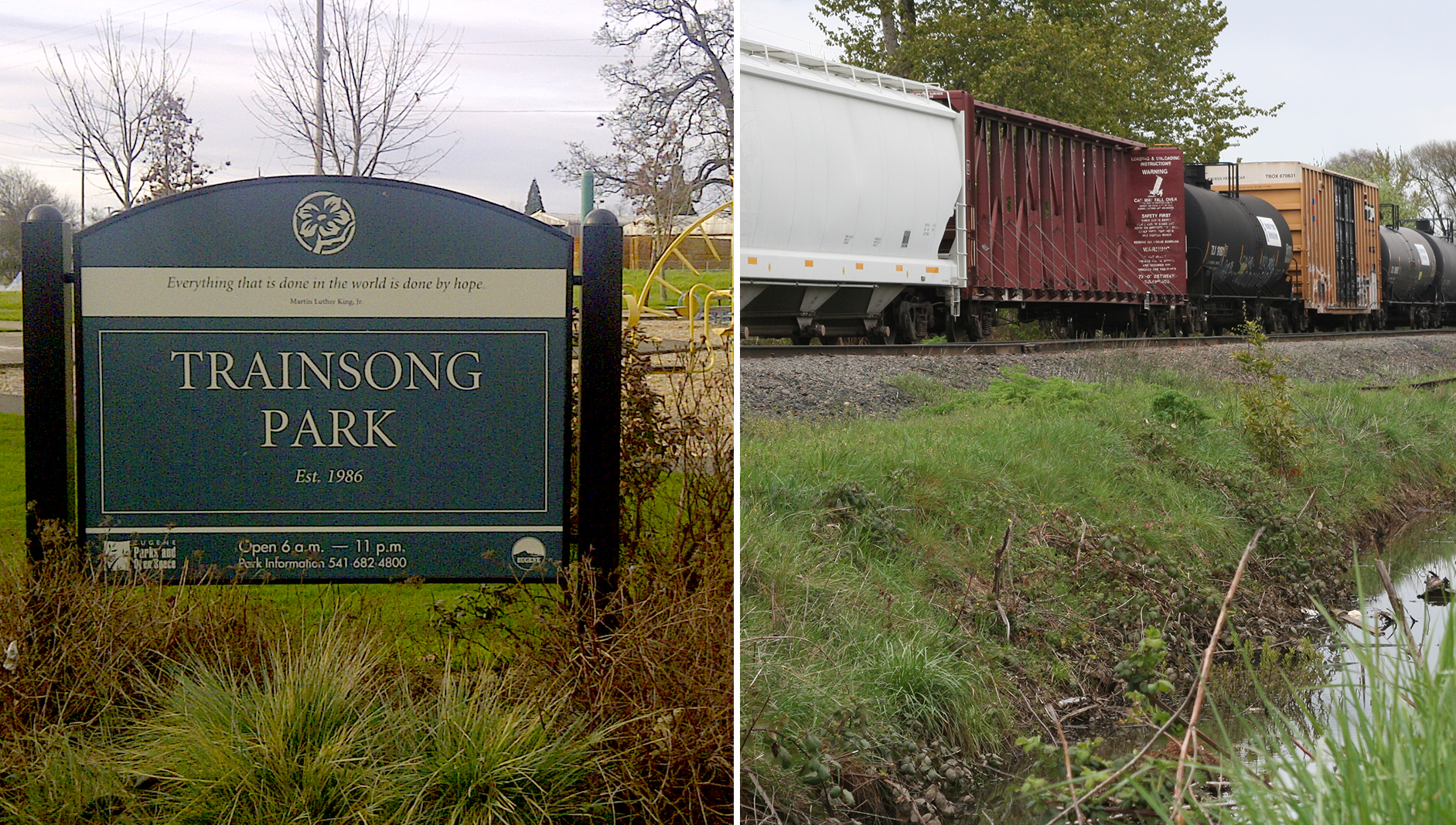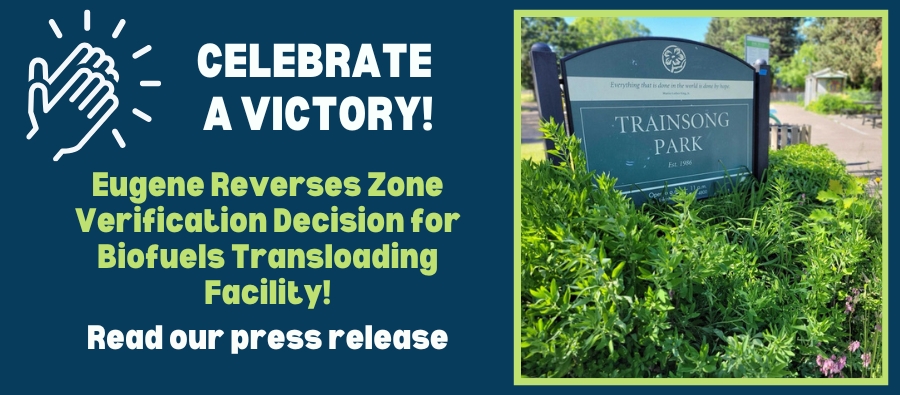Justice for Trainsong

VICTORY!
Eugene Reverses Zone Verification Decision for Biofuels Transloading Facility
Read the Beyond Toxics Press Release (PDF)
NEWS:
Eugene rejects proposal for a fuel transfer facility in Trainsong
By Nathan Wilk, KLCC (January 16, 2025)
Thank you for signing our Petition to the Surface Transportation Board to keep our railroads and surrounding neighborhoods safe!
Union Pacific, the railroad that currently owns and operates the railyard and tracks, has filed for approval to lease this property to Central Oregon and Pacific Railroad (CORP). Union Pacific SMART Transportation Division union members expressed concern about this transition to their federal and state elected leaders as well as the Beyond Toxics team, recognizing our role as community advocates. The union opposes the lease, as it will impact the quality of maintenance of the railroad, as CORP is a Class III railroad with significantly less revenue and limited liability as compared to Union Pacific, a Class I railroad. Union Pacific employs highly skilled union workers, whereas CORP is not held to this standard. Not only does a lease mean UP railroad employees will lose jobs, it also means rail operations and maintenance will have less stringent safety standards and operating procedures that safeguard employees and community members. We share these concerns, as the railroad employees handle railcars full of toxic materials on a daily basis. One failure of operations could result in catastrophic impact for surrounding communities.
How does this relate to the biofuels transfer station?
We, alongside our communities, raised concerns about a proposed biofuel transfer station to be located within the Trainsong neighborhood. While the City has reversed its original approval of the zone verification, the threat of unsafe railroads remains. Already, the trains transport a number of chemicals through these yards every day. If Union Pacific leases the railyard to CORP, less experienced, non-union employees would be responsible for maintaining and operating the yard and all of the hazardous materials traveling through it. Union Pacific wants to cut corners and cut costs at the risk of safety.
Justice for Trainsong Background
In June of 2024, the City of Eugene approved a zone verification for the site at 799 Bethel Drive, for USD Clean Fuels, a biofuels transloading company based out of Houston, TX. The facility would bring train cars full of biofuels and hazardous materials through the railyard, offloading them onto tanker trucks which would then drive through the Trainsong neighborhood along Bethel Drive to deliver this fuel to nearby industries and gas stations. (See the detailed map of the area of West Eugene that would be impacted by these decisions)
Our major concerns
The proposed biofuels transloading facility in this neighborhood would pose a number of threats to people and the environment. The company estimated that 40 tanker trucks would make roundtrips to and from the facility at all hours of the day, primarily between 6:00 p.m. to 6:00 a.m. These railcars and semi trucks would transport an array of highly flammable, toxic chemicals including biodiesel and aviation fuel through narrow neighborhood roads. Community members expressed concern over air and noise pollution, traffic safety risks, and lack of emergency preparedness.
Neighbors took a stand
The Trainsong neighborhood has already been subjected to decades of industrial pollution, contaminated water, and toxic emissions from railyard activities and nearby industries. Then, they wanted to introduce a biofuel terminal in close proximity to home and parks, potentially exposing children and neighbors to even more dangerous pollutants and risk of disaster! The Trainsong and River Road communities, with our support, organized to take a stand against this facility. On Sept. 30, 2024, we appealed the City of Eugene’s zone verification decision to the Oregon Land Use Board of Appeals on the basis that the zoning is inconsistent with the intended use of the space. On January 16, the City reveresed its original zone verification of the site, though we are closely monitoring the situation for any updates or further issues!
Read the USD Zone Verification Comment Letter submitted by Beyond Toxics - Dec. 11, 2024 (PDF)
A Victory for Public Health!
After hearing the community’s concerns, the City revoked its verification of the zone for reconsideration in October, opening a 90-day period of review. In early December, it opened an official public comment period, and community members weighed in on the issue The Planning Division received 229 written comments, mostly from concerned residents, regarding the facility.
In a HUGE victory, the City has reversed its original zone verification decision, thanks in large part to the community’s response. The City determined that the site is in an I-3 Heavy Industrial zone. Eugene’s Planning Division also concluded that USD Clean Fuels qualifies as a "regional distribution center," which is not a permitted use within that zone. Therefore, the City rescinded its original approval and decided that the facility, as planned, is prohibited at in this location!
Eugene rejects proposal for a fuel transfer facility in Trainsong - KLCC news
NEWS related to the Justice for Trainsong campaign
* Union fights railyard lease in west Eugene over safety concerns, potential job cuts by Hannarose McGuinness, R-G (Jan. 30, 2025)
* Trainsong ‘Tank Farm’ - Gasoline storage tanks and distribution plant proposed for Bethel/Trainsong by Christian Wihtol, Eugene Weekly (Jan. 30, 2025)
* Eugene rejects proposal for a fuel transfer facility in Trainsong - Nathan Wilk, KLCC (January 16, 2025)
* Mayor Vinis urging new location for biofuel transfer station - KVAL-TV by Tiffany Lewis (10/28/24)
* Eugene halts biofuel facility proposal amid community concerns - Register-Guard By Hannarose McGuinness (10/24/24)
* Eugene withdraws approval for a new fuel-transfer facility in Trainsong - KLCC By Nathan Wilk (10/18/24)
* Beyond Toxics challenges a proposed fuel-transfer facility in West Eugene - KLCC By Nathan Wilk (10/12/24)
* Pollution concerns reignited as Eugene residents raise alarm over planned fuel facility - Register-Guard By Hannarose McGuinness (10/10/24)
* Bethel community groups hold meeting about proposed fuels facility - KEZI-TV By Jennifer Singh, Robert Desaulniers (10/8/24)
* Residents near proposed Eugene fuel site express spill fears at public forum - KMTR-TV By News Staff (10/8/24)


